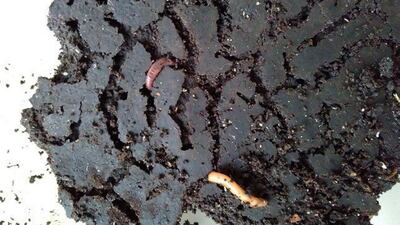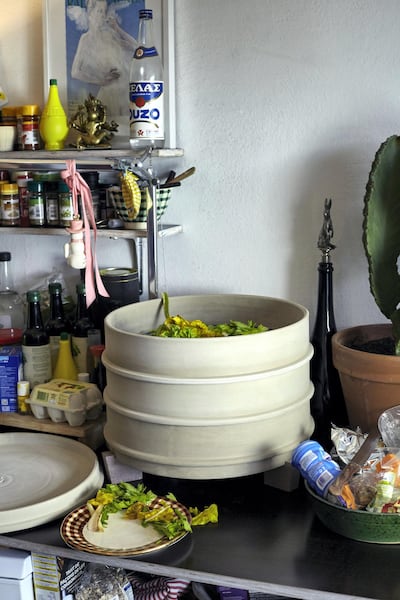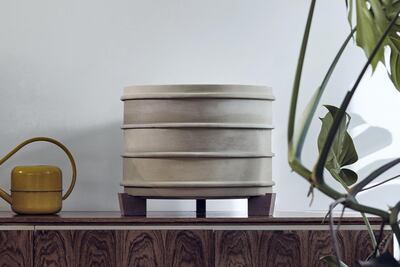If someone told me at the start of this year that I'd live with 1,000 earthworms by the end of it, I would have thrown my dead basil plant at them in protest. Yet here I am, decanting my delivery of writhing, wriggling critters into my most house-proud addition: WormUp. No, I haven't suddenly started worm breeding as a hobby; I actually care deeply about the environment, and this Swiss start-up might just be the ticket to make my home a 100 per cent zero-waste zone.
A breathable ceramic cylinder designed to be a subtle addition to any modern apartment and home to hundreds of earthworms, WormUp is an indoor composting system that transforms all organic waste into active compost that can be used in a home garden. In go leftovers, coffee grounds, worn-out cotton socks and waste paper for the worms to feast on and, in turn, produce one of the best organic fertilisers to add to plants. Mine is set up in my kitchen, but the company website features photographs of WormUp in bathrooms and living rooms, neatly set against mid-century furniture and indoor foliage.
“The vermin-composting process is oxygen-based and CO2 is released in natural quantities,” says WormUp co-founder Sarah Steiner. “It is so harmful to our climate to have organic waste decompose in the mostly anaerobic environment of dumps and landfills.” What she means is when organic waste is tied up in plastic, it isn’t able to “breathe”, producing carbon dioxide as it decomposes in the bag, but running out of vital oxygen to do so.
As a result, the wrapped rubbish begins to produce methane, a greenhouse gas that has a global warming potential that is 104 times greater than carbon dioxide. So when asked why I live with earthworms, by cynics or the squeamish, my response is the UAE alone produces 29 million tonnes of waste each year, with nearly 700,000 tonnes of domestic waste ending up in landfill.
Having worked at Unilever before taking time off to travel, Steiner took a course in permaculture – an ecologically harmonious way of living that gives back to the planet what we take out. "When I came back from my course, I told my dad about the idea that I could put worms in a product and then use it in my flat in Zurich. He said: 'There are four guys [Nikolai Raber, Erich Fassler, Dennis Froesch and Luiz Schumacher] already doing it. I saw them on TV.'" Six months later, Steiner made contact and became the final member of the WormUp team, in 2014.
Launched to great success two years later, WormUp was born out of a crowdfund; 100 composters sold within 24 hours with the product still to be made. “We put 300 pieces up altogether and sold out after 10 days. We made 80,000 Swiss francs in just over a week,” says Steiner, who admits: “When we started, we were thinking: ‘Are we the only ones who think it’s a cool idea? Do people really want worms in their living room?’”
Of course, the critters aren’t loose or free to roam. Delivered up to one week after your ceramic cylinder, complete with separation grids, the earthworms are sourced locally. “We wouldn’t compromise our animals by sending them across borders,” says Steiner.
Once the worms, sourced by WormUp from a local supplier, arrive, they go into my composter and await the first layer of organic waste. It takes up to six months for them to produce the initial “harvest” – which is essentially castings from the 1,000 ravenous worms going to town on my waste. “It gives you a fertiliser that’s one of the best for your plants. If you grow tomatoes or roses, you can really see the difference,” says Steiner.
Initially I’m worried about touching the little wrigglers, but it’s only once in a while when I check up on my mini ecosystem that I put my hands into the cylinder. After the first harvest, I’m told the composter needs to be emptied every three to four months, depending on what my worms are being fed.
It helps that Steiner and the team are on hand during moments of confusion. The start-up is still relatively small, but WormUp provides 360-degree service, from finding and locating the earthworms in your region, through to guiding you on the set up (should you need it) and remaining available for any questions or issues that may arise.
Composting with worms is, of course, not a new idea, with worm composting becoming increasingly popular in the US. Companies such as Hungry Bin specialise in worm composters. In the UAE, too, there is interest in worm composting, with “red wrigglers” on sale at Desert Cart. The difference with WormUp is that it’s designed to keep within the home. In fact, Steiner advises against keeping it outside, because the worms become “compromised” at temperatures over 30°C and under 0°C.
Another reservation I had about composting indoors and sharing a roof with hundreds of earthworms was that my apartment would develop an odour, but I (and, perhaps more discerningly, visitors) can attest to a smell-free home. “If you put organic waste into something plastic, the smell can get really nasty, but with our product, the breathable clay prevents this,” says Steiner.
Having previously killed every plant that I’ve ever owned, I also happen to have the happiest, greenest indoor foliage ever; even my basil is flourishing. Worms, as it turns out, are my new best friend.



